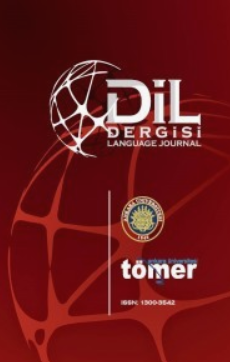RUSÇADA ZARF YAPILARININ İNCELENMESİ ÜZERİNE
ON THE STUDY OF ADVERB STRUCTURES IN RUSSIAN
Author(s): Leyla Çiğdem DalkılıçSubject(s): Foreign languages learning, Theoretical Linguistics, Morphology, Semantics, Language acquisition, Eastern Slavic Languages
Published by: Ankara Üniversitesi TÖMER
Keywords: Adverbs; Russian; Morphology;
Summary/Abstract: In the process of foreign language learning the students learn many different parts of speech in detail, however, there are some topics that are focused on superficially. In teaching Russian as foreign language, the adverbs as part of speech is one of those topics on which a little attention is paid. Adverbs are the most important linguistic elements that make up the semantic richness of a language. Till now no direct researches have been carried out in Turkey on the topic of adverbs in the Russian language and this topic has been superficially and marginally covered in grammar textbooks, it clearly shows that these structures are ignored in teaching Russian as foreign language. The limited and insufficient resources available on this topic lead to poor understanding of their usage, function and structure by the students. Another problem related to the usage of adverbs lies in the fact, that due to the structural similarities with other words, the functional features they may have in a sentence are not fully understood. The fact that there are different approaches in the Russian grammar tradition according to the definition, structure, semantic and functional features of adverbs shows this insufficiently studied grammatical part of speech should be examined in more details. In this study, the adverbs in Russian are examined from three points of view, such as structural, semantic and functional points of view, and the difficulties in assimilating and distinguishing these structures are also discussed in detail. The aim of this study is to present the features of adverbs in Russian from a broad perspective and systematically to help the Turkish native speakers better understand the adverb structures in Russian, which they learn as foreign language. In addition to this, another aim of this study is to introduce the approaches to Russian adverbs to large audiences, which have not been covered in Turkey in Russian studies.
Journal: Dil Dergisi
- Issue Year: 172/2021
- Issue No: 1
- Page Range: 60-85
- Page Count: 26
- Language: Turkish

